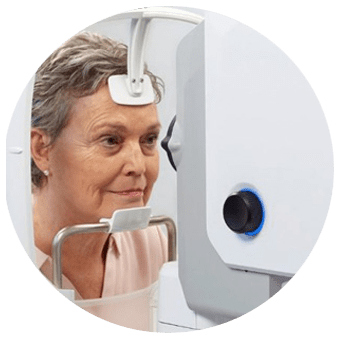At Envision Eye Care, our skilled eye doctors and dedicated staff are passionate about providing you with individualized solutions for all your vision needs. Whether you’re coming to us for your annual comprehensive eye examination or help managing an ocular disease, we’ll provide you with high-quality care you can count on.
Diabetic retinopathy is a condition that can permanently alter your vision, which is why we provide ongoing monitoring and solutions to manage the progression of this disease and preserve your sight. Read on to learn more about diabetic retinopathy, its symptoms, and how we treat it.
SCHEDULE AN APPOINTMENT WITH US TODAY!
What is Diabetic Retinopathy?
Diabetes is a disease that causes the body to struggle to efficiently convert blood sugar into energy. Diabetes affects the entire body, and the eyes are no exception: one of this condition’s most severe potential complications is diabetic retinopathy.
Diabetic retinopathy is caused by damage to the retina, the layer of tissue at the back of the eye that senses light and sends signals to the brain, enabling sight. When blood sugar levels become too high, it can cause the retina’s blood vessels to swell and leak, which leads to vision loss.
The longer a person has had diabetes, the more likely it is that they will have some degree of diabetic eye disease. Other potential eye-related complications of diabetes include the development of cataracts an at earlier age, macular degeneration and macular edema, and glaucoma.

Symptoms of Diabetic Eye Disease
Diabetic retinopathy can develop in anyone who has diabetes, type 1 or type 2, and will usually affect both eyes. At first, it may only cause slight vision problems, but it will eventually lead to blindness if left untreated. Symptoms of diabetic retinopathy include:
- An increased number of spots or floaters
- Blurred or fluctuating quality of vision
- Impaired or washed-out color vision
- Dark or blank areas in the vision field
- Poor night vision
- Vision loss
If you have diabetes, it’s important to see your eye doctor for a yearly examination — even if you’re not experiencing vision problems — because the symptoms of diabetic retinopathy can come on slowly. The sooner this condition is detected, the better the chances of effectively managing this disease. An annual diabetic eye exam is generally covered by your medical insurance to keep your diabetes in check and your eye health stable.

Symptoms of Diabetic Eye Disease
Diabetic retinopathy can develop in anyone who has diabetes, type 1 or type 2, and will usually affect both eyes. At first, it may only cause slight vision problems, but it will eventually lead to blindness if left untreated. Symptoms of diabetic retinopathy include:
- An increased number of spots or floaters
- Blurred or fluctuating quality of vision
- Impaired or washed-out color vision
- Dark or blank areas in the vision field
- Poor night vision
- Vision loss
If you have diabetes, it’s important to see your eye doctor for a yearly examination — even if you’re not experiencing vision problems — because the symptoms of diabetic retinopathy can come on slowly. The sooner this condition is detected, the better the chances of effectively managing this disease. An annual diabetic eye exam is generally covered by your medical insurance to keep your diabetes in check and your eye health stable.

How Do We Test for
Diabetic Retinopathy?
The best way to diagnose diabetic retinopathy is during a dilated eye exam. There are also several pieces of imaging technology that can help detect the disease as early as possible. This will help us detect symptoms like retinal swelling, poor retinal blood vessel circulation, or new or abnormal retinal blood vessels.

How is Diabetic Retinopathy Treated?
Treatment for diabetic retinopathy starts with careful management of your diabetes with the help of your doctor and monitoring your condition with yearly eye examinations. However, if diabetic eye disease has advanced far enough, surgical treatment may be required to preserve your sight.
When you come in for a diabetic eye exam, our optometrists will assess your retinas and overall eye health to determine which treatment would benefit your case, or whether it’s necessary to refer you to a trusted ophthalmologist for further treatment.
DIABETIC EYE SPECIALISTS IN VIRGINIA AND TENNESSEE
Whether you have recently been diagnosed with diabetes or have been managing your condition for years, it’s important to take steps to protect yourself against complications that may put you at risk for vision loss. At Envision Eye Care, we encourage patients with diabetes to schedule an annual diabetic eye exam to help protect their vision. Give us a call to schedule your examination today!
SCHEDULE AN APPOINTMENT WITH US TODAY!
WHAT OUR PATIENTS ARE SAYING
– L.C.
– J.A.
– C.S.
– P.T.
– L.C.
– C.S.
– J.A.
– P.T.
